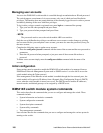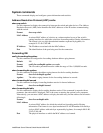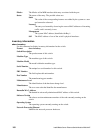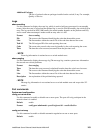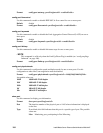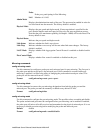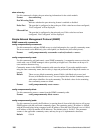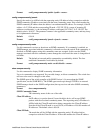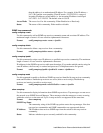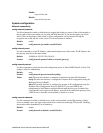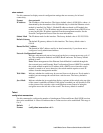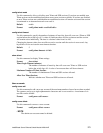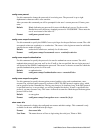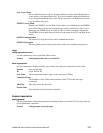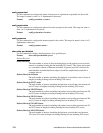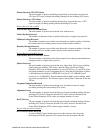168 Intel® Blade Server Ethernet Switch Module IXM5414E
then the address is an authenticated IP address. For example, if the IP address =
9.47.128.0 and the corresponding Client IP mask = 255.255.255.0, a range of
incoming IP addresses would match, i.e. the incoming IP address could equal
9.47.128.0 - 9.47.128.255. The default value is 0.0.0.0.
Access Mode The access level for this community. Either Read/write or Read-only.
Status The status of this community. Either enable or disable.
SNMP trap commands
config snmptrap create
Use this command to add an SNMP trap receiver community name and associated IP address. The
maximum length of name is 16 case-sensitive alphanumeric characters.
Format config snmptrap create <name> <ipaddr>
config snmptrap delete
Use this command to delete a trap receiver from a community.
Format config snmptrap delete <name> <ipaddr>
config snmptrap ipaddr
Use this command to assign a new IP address to a specified trap receiver community. The maximum
length of name is 16 case-sensitive alphanumeric characters.
IP addresses in the SNMP trap receiver table must be unique. If you make multiple entries using the
same IP address, the first entry is retained and processed. All duplicate entries are ignored.
Format config snmptrap ipaddr <ipaddrold> <name> <ipaddrnew>
config snmptrap mode
Use this command to enable or disable an SNMP trap receiver identified by trap receiver community
name and IP address. Enabled trap receivers are active (able to receive traps). Disabled trap
receivers are inactive (not able to receive traps).
Format config snmptrap mode <enable/disable> <name> <ipaddr>
show snmptrap
Use this command to display information about SNMP trap receivers. Trap messages are sent across
the network to an SNMP Network Manager. These messages alert the manager to events occurring
within the switch or on the network. Up to six trap receivers are supported at the same time.
Format show snmptrap
SNMP Trap Name
The community string of the SNMP trap packet sent to the trap manager. Note that
trap receiver communities and SNMP communities are separate and distinct.
IP Address The IP address that receives SNMP traps from the switch for this trap receiver
community.
Status Indicates whether traps are currently enabled for this community



